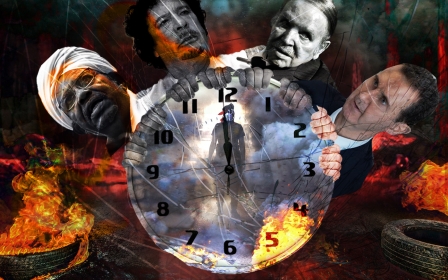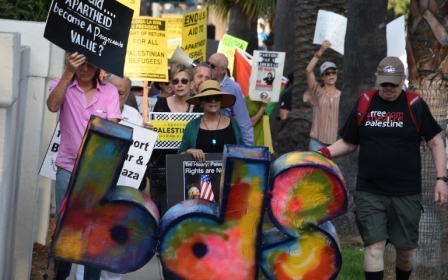2020 BDS: The unstoppable spread of moral judgement threatens Israel

When the call for boycott, divestment and sanctions (BDS) was issued in July 2005, almost 15 years ago, those of us who promoted it spent literally years explaining what the three components were.
B is for boycott, meaning an individual consumer restraining from purchasing an Israeli product or a product by any company that benefits from Israel’s oppression of Palestinians. Products such as SodaStream, initially manufactured in an illegal settlement, were to be boycotted, along with Caterpillar, a US product whose D9 bulldozers are retrofitted by the Israeli military with a special blade to be used for Palestinian home demolitions.
D is for divestment, which means not investing your money in the stocks of companies that benefit from Israel’s oppression of Palestinians. S stands for sanctions, which individuals cannot engage in, but must ask their political representatives to impose. We knew this would be the hardest, and certainly the last one to happen, if indeed it were to happen.
An existential threat
The underlying assumption behind BDS is that it is a form of economic activism. Most progressives are delighted at the opportunity to make political choices as they shop - to “vote with their wallet”, as the expression goes.
New MEE newsletter: Jerusalem Dispatch
Sign up to get the latest insights and analysis on Israel-Palestine, alongside Turkey Unpacked and other MEE newsletters
But the reality is, while BDS is a form of activism that may take on an economic guise, it is not “all about the Benjamins”. We could boycott every Israeli consumer item in every supermarket around the country, and we would not make much of a dent in Israel’s economy.
What BDS has achieved ... is a complete transformation of the public perception of Israel, putting the country on the defensive
Yet BDS is viewed as an existential threat to Israel, even though the Israeli co-owned Sabra hummus has grown to have the lion’s share of the market for chickpea dips, while most food co-ops and grocery stores around the world still stock Israeli products, despite repeated pleas by activists to de-shelve them. Indeed, as early as 2007, the highly influential Israeli think tank Reut Institute declared BDS “a strategic threat with potentially existential implications”.
That “strategic threat” is not to Israel’s economy, but rather, to its image. As BDS activists and organisers explain why we are calling for a boycott of Israeli products, we have had a greater effect on the discourse about Israel, than on Israel’s sales abroad.
Human rights violations
When we discuss the Sabra boycott, for example, we speak of the Israeli army’s human rights violations, not the economics behind the pricing of the culturally appropriated dip. As we explain to artists that their performances in Israel normalise apartheid, we are denouncing Israel’s discriminatory policies, and its violent treatment of the indigenous people whose land it occupies.
We tell artists who perform in Tel Aviv that their music cannot convey a universal message if Palestinians in Ramallah or Gaza City cannot attend the concert because of Israel’s occupation of the West Bank and illegal siege of the Gaza Strip.
When we call for an academic boycott of complicit Israeli universities, we use the argument that the region’s self-proclaimed “only democracy” is not an equal opportunity educator, and will turn away US applicants of Arab or Muslim origin.
What BDS has achieved, which can never be measured in dollars, euros or shekels, is a complete transformation of the public perception of Israel, putting the country on the defensive.
Even though many are celebrating the fact that a handful of US politicians, even presidential candidates, are contemplating conditioning aid to Israel - in effect, broaching the possibility of sanctions - what we must celebrate is the fact that US politicians who have so far provided complete immunity to Israel are finally understanding that we, the voters, wish to hold Israel accountable. And we are making that very clear.
Demanding action
Just about every progressive politician in the US today is receiving calls, letters and visits from activists, demanding that they hold Israel answerable for its violations of international law and the human rights of the Palestinian people.
Bernie Sanders, the favourite presidential candidate of progressive Democrats, knows full well that his base wants accountability from Israel, rather than the carte blanche President Donald Trump has offered. And activists in groups such as IfNotNow are confronting politicians at various stops on the campaign trail, demanding that they take political action against Israel’s transgressions.
In a capitalist economy, we can only do that through economic means. But behind our economic demands is a moral judgement. And as 2019 draws to an end, with the 2020 US presidential election ramping up, the unstoppable spread of this moral judgement threatens Israel.
The views expressed in this article belong to the author and do not necessarily reflect the editorial policy of Middle East Eye
Middle East Eye delivers independent and unrivalled coverage and analysis of the Middle East, North Africa and beyond. To learn more about republishing this content and the associated fees, please fill out this form. More about MEE can be found here.







